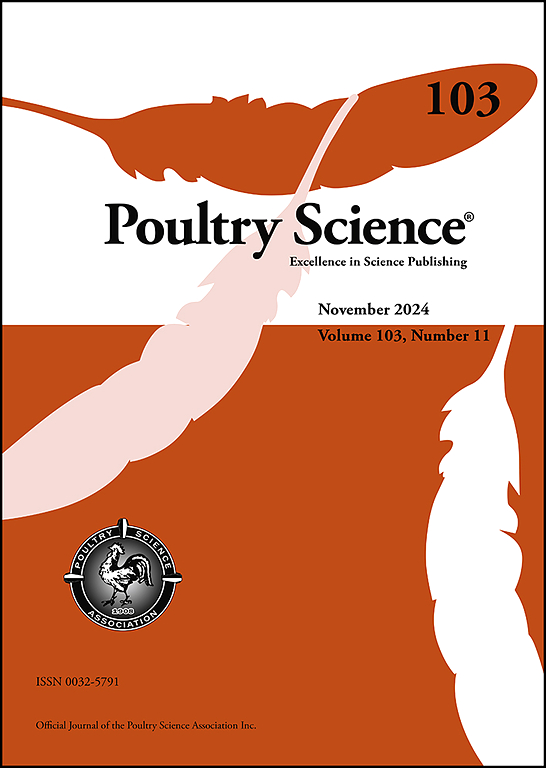Changes in gut microbiota affect DNA methylation levels and development of chicken muscle tissue
IF 3.8
1区 农林科学
Q1 AGRICULTURE, DAIRY & ANIMAL SCIENCE
引用次数: 0
Abstract
The intestinal microbiome is essential in regulating host muscle growth and development. Antibiotic treatment is commonly used to model dysbiosis of the intestinal microbiota, yet limited research addresses the relationship between gut microbes and muscle growth in yellow-feathered broilers. In this study, Xinghua chickens were administered broad-spectrum antibiotics for eight weeks to induce gut microbiome suppression. We investigated the relationships between the gut microbiome and muscle growth using 16S rRNA sequencing and transcriptomic analysis. Results indicated that antibiotic treatment significantly reduced body weight, dressed weight, eviscerated weight, and breast and leg muscle weight. Microbial diversity and richness in the duodenum, jejunum, ileum, and cecum were significantly decreased. The relative abundances of Firmicutes, Actinobacteria, and Bacteroidetes declined, while Proteobacteria increased. This microbial imbalance led to 298 differentially expressed genes (DEGs) in muscle tissue, of which 67 down-regulated genes were enriched in skeletal muscle development, including MYF6, MYBPC1 and METTL21C genes essential for muscle development. The DEGs were primarily involved in the MAPK signaling pathway, calcium signaling pathway, ECM-receptor interaction, actin cytoskeleton regulation, and nitrogen metabolism. Correlation analysis showed that dysregulation of the cecal microbiome had the most substantial effect on muscle growth and development. Furthermore, intestinal microbiome dysregulation reduced DNMT3b and METTL21C mRNA expression in muscle tissue, lowered overall DNA methylation and SAM levels, and induced methylation changes that impacted skeletal muscle development. This study demonstrates that gut microbiota influence DNA methylation in muscle tissue, thereby associated with muscle growth and development.
求助全文
约1分钟内获得全文
求助全文
来源期刊

Poultry Science
农林科学-奶制品与动物科学
CiteScore
7.60
自引率
15.90%
发文量
0
审稿时长
94 days
期刊介绍:
First self-published in 1921, Poultry Science is an internationally renowned monthly journal, known as the authoritative source for a broad range of poultry information and high-caliber research. The journal plays a pivotal role in the dissemination of preeminent poultry-related knowledge across all disciplines. As of January 2020, Poultry Science will become an Open Access journal with no subscription charges, meaning authors who publish here can make their research immediately, permanently, and freely accessible worldwide while retaining copyright to their work. Papers submitted for publication after October 1, 2019 will be published as Open Access papers.
An international journal, Poultry Science publishes original papers, research notes, symposium papers, and reviews of basic science as applied to poultry. This authoritative source of poultry information is consistently ranked by ISI Impact Factor as one of the top 10 agriculture, dairy and animal science journals to deliver high-caliber research. Currently it is the highest-ranked (by Impact Factor and Eigenfactor) journal dedicated to publishing poultry research. Subject areas include breeding, genetics, education, production, management, environment, health, behavior, welfare, immunology, molecular biology, metabolism, nutrition, physiology, reproduction, processing, and products.
 求助内容:
求助内容: 应助结果提醒方式:
应助结果提醒方式:


